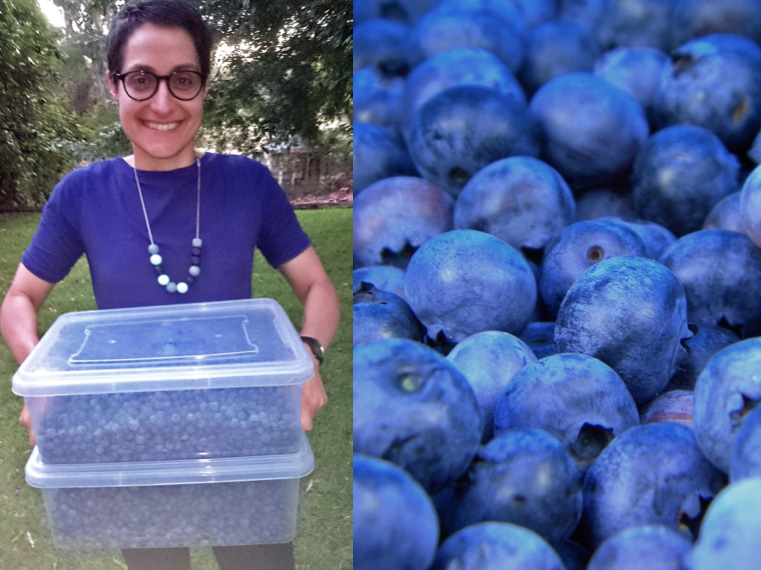
Then consider making a smoothie!
Whenever I’m feeling lazy and I just want a quick energy boost, I make a smoothie.
All you need are a few basic ingredients and a blender. In less than a minute, you can have a wholesome snack that is packed full of nutrients.
So here it is! This is my favourite brain boosting smoothie recipe:
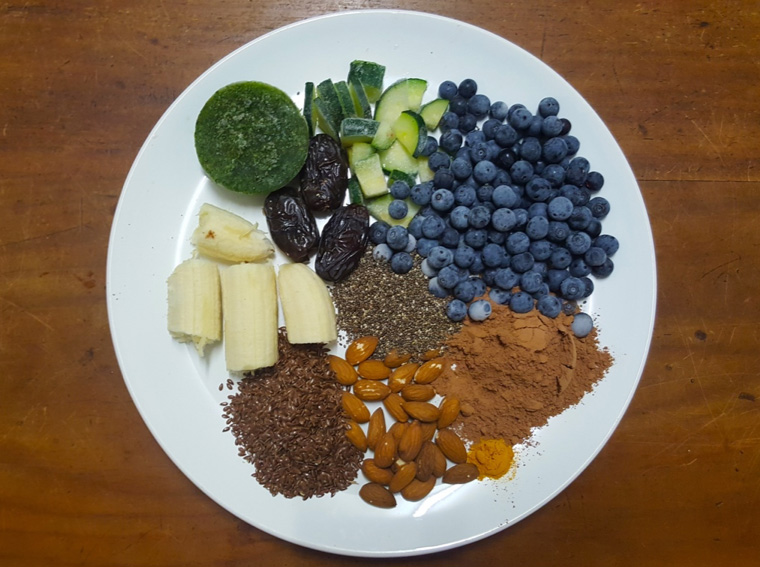
2 tablespoons of cocoa or cacao powder (no added sugar)
2 tablespoons of flaxseed
1 tablespoon of chia seeds
1 cup of blueberries
½ cup of frozen zucchini
Handful of greens
Handful of almonds
1 ripe banana
2-3 medjool dates (seeds removed)
¼- ½ teaspoon of turmeric powder
2 cups of water
Place all the ingredients in a blender. Blitz for 1-2 minutes (depending on how powerful your blender is). Blitz until completely smooth (you don’t want any big chunks).
Note: This recipe produces a lot of smoothie. You don’t need to consume all of it in one sitting. I usually pour any extra smoothie into a jar and store in the fridge to have later in the day.
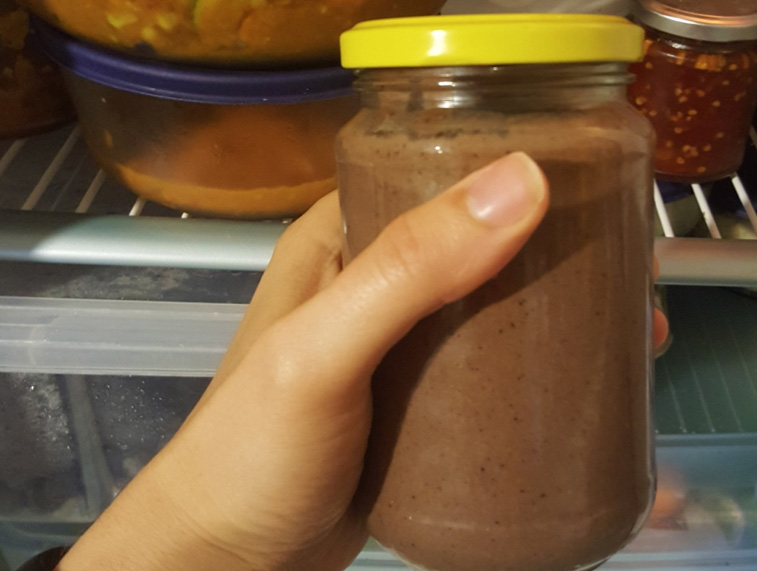
I used to add a scoop of store bought protein powder to my smoothies. But then I realised I could save a lot of money and avoid a lot of nasty chemical additives by making my own.
In her book Simplicious Flow Sarah Wilson shares a simple and easy protein powder you can make at home.
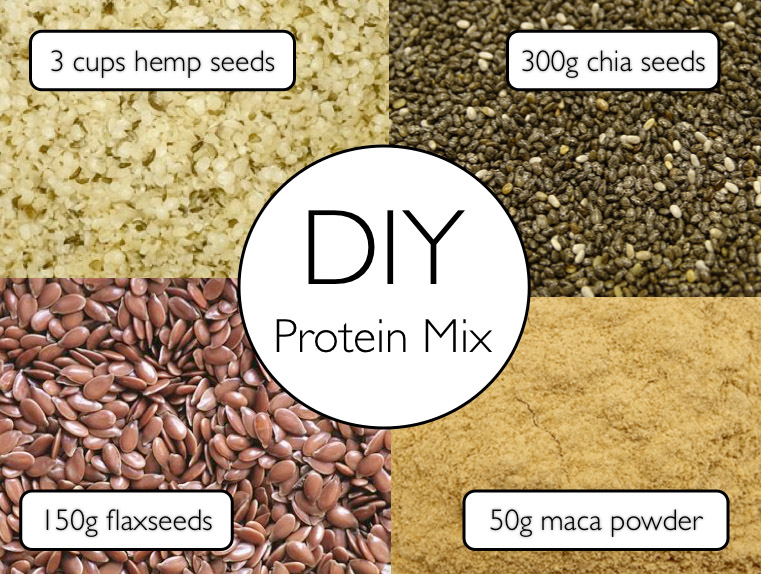
300g chia seeds
150g flaxseeds
3 cups hemp seeds
50g maca powder
Note: You can get these ingredients from most bulk food stores and major supermarkets (look in the health food section).
Mix together and store in a jar in your fridge. Whenever you’re making a smoothie, throw a quarter cup of this mixture in. This is much better than the overly packaged and ultra-processed protein powders that you get at the shops.
There are no hard and fast rules when it comes to making smoothies. You don’t have to stick to strict measurements and specific ingredients.
But if you’re totally new to the world of smoothie making, try my smoothie recipe and see how you go.
Share This:

If so, you could be suffering from decision fatigue.
Decision fatigue occurs when you have to repeatedly make decisions. Every decision you make takes effort and depletes some of your mental resources. By the end of the day – after making hundreds of decisions – you feel mentally drained.
You struggle to make simple decisions (e.g., “What will I have for dinner?”) and the quality of your decisions deteriorates too (“I’ll get Uber eats”).
In the book The Gap and The Gain, Dr Benjamin Hardy describes decision fatigue as follows:
“Decision fatigue happens when you’re not sure what you’re going to do. It’s when you’re torn between options and, due to your indecisiveness, you often cave to the tempting worse option.”
Sound familiar?
Instead of studying, you go on social media.
Instead of cooking a healthy meal for dinner, you order greasy fish and chips.
Instead of getting to bed at a reasonable hour, you watch another episode on Netflix.
Unless you have the self-discipline and mental clarity of a Zen master, decision fatigue is something we have all experienced.
Research has found even people who are expert decision makers (i.e., judges) suffer from decision fatigue.
In one study researchers examined 1,112 judicial parole decisions by eight experienced judges at different times throughout the day.
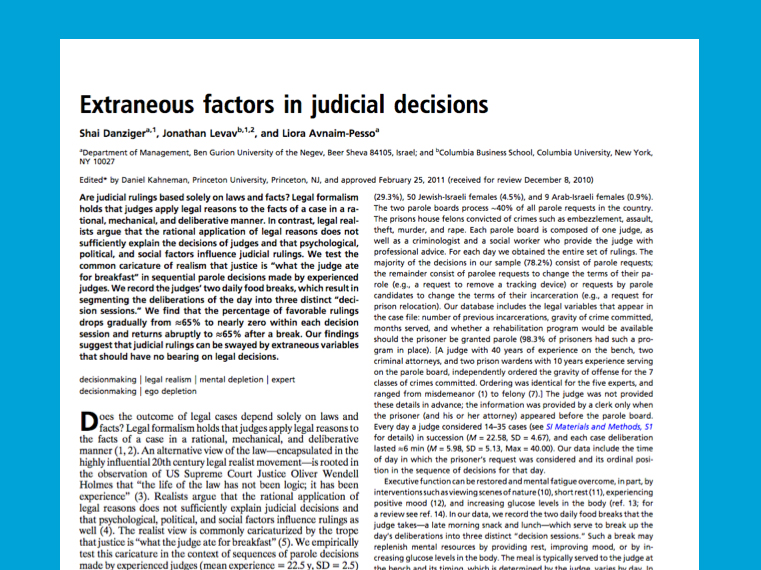
The researchers found if prisoners appeared before the judges at the very beginning of the day or after a food break (morning tea or lunch), they were more likely to get granted parole than prisoners who appeared later in the sequence of cases in a session.
In fact, they found the probability of a favourable decision dropped from 65% to almost 0% from the first ruling to the last ruling with each sitting session.

What was going on?
When the judges started their work day, they had a lot of mental resources available. One would assume these judges had slept well and had some breakfast.
But as each sitting session progressed, each decision they made depleted their mental resources and executive function. Just before morning tea or lunch, their mental resources would have been running low.
The researchers argued that when the judges had limited mental resources they became increasingly punitive. They simplified their judicial decisions and went with the status quo which was to deny parole requests.
This phenomenon is known as the Irrational hungry judge effect.
What do you do with a hangry judge?
Give them plenty of breaks and food.
In this study, the judges’ mental resources seemed to be replenished and their decision making ability restored after morning tea and lunch breaks.
What does this research on hangry judges have to do with your studies and work?
Here’s how it relates . . .
For optimal brainpower, you have to schedule in rest breaks. If you don’t schedule in regular rest breaks, they often don’t happen. You also need to take care of yourself with healthy food and healthy lifestyle practices and eliminate trivial decisions wherever you can.
Here are some simple and practical things you can do to overcome decision fatigue and keep your mental resources topped up:
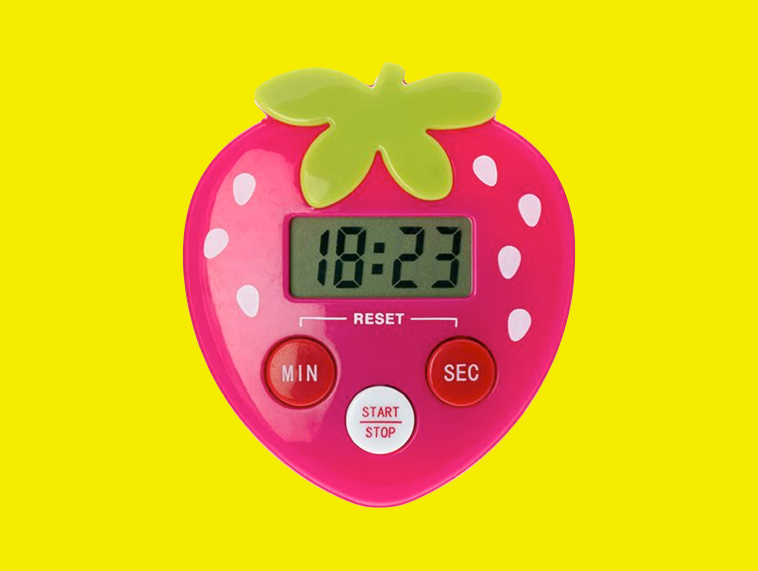
I like to have a digital timer within arms reach at all times when I’m working. At the start of a work session, I’ll set the timer for 20-30 minutes. When the timer goes off that’s my cue to get up and move.
The timer reminds me that:
1) I’m not a robot; and
2) I need to take breaks to replenish my mental resources.
Clicking and scrolling through your social media feed can rapidly deplete your mental resources. Jumping around the Internet from one random post or video to another can erode your attention and willpower. As the Center for Humane Technology states:
“When endless content creates an overwhelming amount of want, we can end up addicted to seeking satisfaction, clicking and scrolling, mindlessly consuming content, often with minimal oversight from cognitive control regions of the brain. Ultimately, this behavior drains our energy.”
Social media algorithms also promote content that provoke angry reactions over neutral and positive reactions. When you see posts that fill you with anger and other negative emotions (e.g., fear, envy, and anxiety), this can also leave you feeling drained.
So, be intentional about your social media use. Ask yourself, “Why am I going on here? What’s the point?” If it’s for fun and/or entertainment, that’s fine. But it’s a good idea to have your digital timer nearby and set a time limit. When the timer goes off, say out loud “That’s enough. I’m getting off!”.
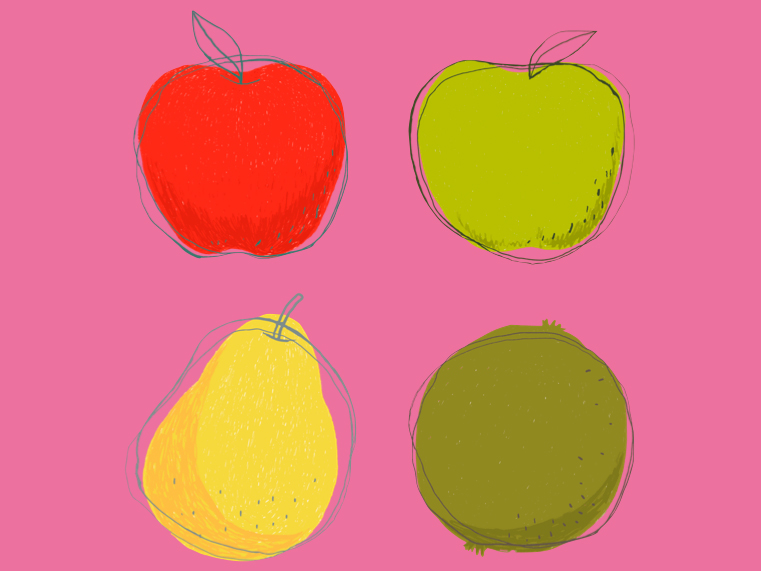
Your brain needs energy to function at an optimal level. Where does it get that energy from?
Simple answer: food.
Author of The Willpower Instinct Dr Kelly McGonigal recommends fuelling your body with foods that give you lasting energy. She states:
“Most psychologists and nutritionists recommend a low-glycemic diet- that is, one that helps you keep your blood sugar steady. Low-glycemic foods include lean proteins, nuts and beans, high-fiber grains and cereals, and most fruits and vegetables-basically, food that looks like its natural state and doesn’t have a ton of added sugar, fat, and chemicals.”
Establishing habits, pre-planned responses, and checklists reduces the number of decisions you need to make, subsequently preventing decision fatigue.
I’m a big fan of tiny habits and implementation intentions to help streamline the day. I also have a folder of checklists to help me pack equipment for various trips, work jobs, and community events.
These checklists make all the difference, especially when packing for trips away. The night before I go away, I grab my packing list and start throwing items into my bag. Very little mental effort and/or decision making is required! I get to start my holiday full of energy rather than feeling mentally depleted and grumpy.
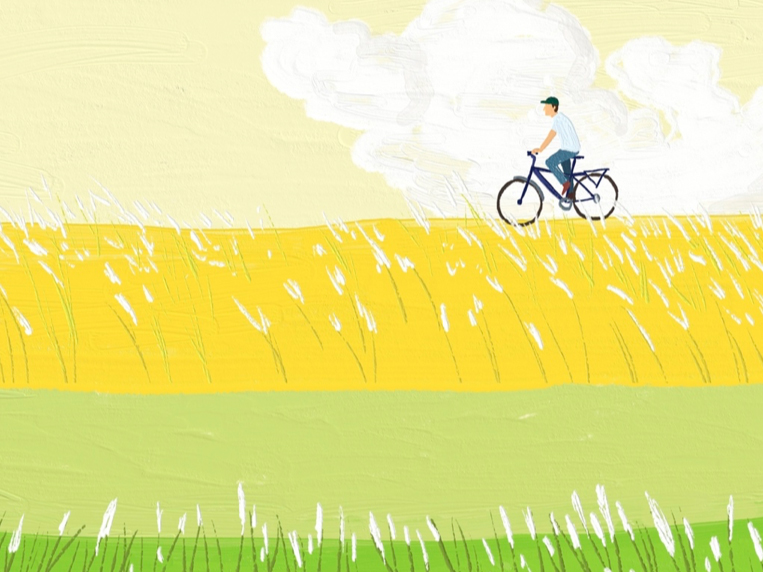
If you’re feeling overworked and mentally frazzled, head outside for a good dose of nature. Research by Hartig shows nature can restore deficits in attention and make people think and feel better.
I understand when you’re feeling tired, the last thing you want to do is get up and move. But research shows a five minute walk can do your brain the world of good.
One study found taking six regular five minute walking breaks every hour left people feeling more energised and less fatigued than people who just took one 30 minute walking break and sat for the rest of the day.

Can you lay out your clothes the night before? Pack your lunch and bag before you go to bed? Write a short to-do list for the next day? If you can knock off a few trivial decisions the night before, this is going to lighten your mental load the next day.
I love the energising effect of taking a post-lunch/afternoon siesta. I started taking power naps when I was an exchange student in Italy. My Italian host mother insisted I take a nap after lunch (it’s what everyone in the village did). So, when in Rome . . .
I grew to love taking naps. In fact, I’ve continued the practice for the past 20 years.
I recommend limiting your naps to 15-30 minutes in duration (any longer and you risk waking up feeling groggy). To avoid messing with your sleep at night, make sure you take your nap before 5pm.
We can all learn a thing or two from the example of the punitive behaviour of the hangry judges. To avoid the Irrational hungry judge effect you need to take care of yourself.
The good news is there’s a lot you can do to replenish your mental resources. If you take a few minutes here and there to engage in tiny self care practices, not only will you feel better but you’ll more likely make better decisions.
I don’t think so.
Students who look like they are naturally smart just have a bit of a head start on the rest of the class.
From the outside, it looks like easy street for these ‘smart’ students. They are cruising along, getting good marks without a lot of effort (or so it seems). But because we are not privy to every aspect of their lives, most of us are completely unaware of the invisible advantages these students have.
Invisible advantages?
Let me explain . . .
I know a young man who did really well at physics in high school. From the outside, it looked like he was naturally talented at the subject. But if you were to take a closer look at his home environment, you’d soon realise that there were other factors at play.
Guess what his parents do for a living?
They are both award winning physics professors.
From a very young age, he got to travel the world with his parents as they attended physics conferences.
Guess what his older brother does?
He’s an academic, too. In which department?
Physics.
Think about it, since the day he was born he has been immersed in the world of physics. His family lives and breathes physics!
When family friends (i.e. other physics professors, PhD and Masters students) come over for dinner parties, what do you think they talk about?
Physics.
You’d expect this young man to excel at physics!
But not because he’s naturally smart at it (he’s not). He excels because he’s been exposed to the ideas and language much more than the average physics student. And in year 12, if he got stuck? Plenty of help was at hand. It was like he was living with three private physics tutors.
Of course, I have to give this young man some credit. His success didn’t solely come down to his family members being physicists.
He applied himself.
He turned up to his physics classes.
He studied for his tests and exams (his parents and brother couldn’t do this work for him).
But it helped being raised in an environment where physics was seen to be fun, exciting and fascinating. It helped a lot.
In his book Atomic Habits, James Clear tells the story of a Hungarian man called Laszlo Polgar and his three daughters, Susan, Sofia and Judit. He states:
“Laszlo was a firm believer in hard work . . . he completely rejected the idea of innate talent. He claimed that with deliberate practice and the development of good habits, a child could become a genius in any field. His mantra was “A genius is not born, but is educated and trained.”
Laszlo wanted to test out this idea with his three girls. So here’s what Laszlo did . . .
“Laszlo decided chess would be a suitable field for the experiment and he laid out a plan to raise his children to become chess prodigies. The kids would be home-schooled . . . The house would be filled with chess books and pictures of famous chess players. The children would play against each other constantly and compete in the best tournaments they could find. The family would keep a meticulous file system of the tournament history of every competitor the children faced. Their lives would be dedicated to chess.”
You bet!
Here’s how James Clear sums up Laszlos’s daughters’ achievements:
“Susan, the oldest, began playing chess when she was four years old. Within six months, she was defeating adults.
Sofia, the middle child, did even better. By fourteen, she was a world champion, and a few years later, she became a grandmaster.
Judit, the youngest, was the best of all. By age five, she could beat her father. At twelve, she was the youngest player ever listed among the top one hundred chess players in the world . . . For twenty-seven years, she was the number-one-ranked female chess player in the world.”
Now you might be thinking, “What kind of gruelling childhood did these poor girls have?” but don’t feel sorry for them. If you watch interviews (like this one), you’ll hear the sisters talk about how enjoyable their upbringing was. They really loved playing chess.
Your parents don’t need to be world experts for you to excel at school and life. The point is this . . .
You can improve in any area if you apply yourself.
But you’ll need to develop an interest in your subjects. Don’t rely on your school teachers to make your subjects interesting. It’s time to take charge of your learning. It’s up to you to find ways to make learning fun.
Don’t limit yourself to your textbook. Go and explore other resources: online courses (check out classcentral.com), TED talks, interesting podcasts, documentaries, free talks and your local library.
Read as much as you can. Ease into new topics with graphic novels and kids books. Once you’ve mastered the basics, move onto more complex reading materials.
Finally, if you can, surround yourself with people who have similar goals and interests. They may not be in your neighbourhood or school community, but you can find them in online communities.
For example, I was interested in learning more about how to eat and cook in a healthy way. So I enrolled in an online course that explored plant-based nutrition. This course connected me with people from all over the world who were also interested in developing healthy eating habits.
Instead of feeling like I was being a bit extreme for saying no to the Frankfurt sausages and party pies at events, this online community empowered me to keep making healthy lifestyle choices.
As James Clear says:
“One of the most effective things you can do to build better habits is to join a culture where your desired behaviour is the normal behaviour. New habits seem achievable when you see others doing them every day. If you are surrounded by fit people, you’re more likely to consider working out to be a common habit. If you’re surrounded by jazz lovers, you’re more likely to believe it’s reasonable to play jazz every day. Your culture sets your expectation for what is “normal”. Surround yourself with people who have the habits you want to have yourself. You’ll rise together.”
1. What do you want to learn and/or get better at?; and
2. Are there any communities that can support you with this?
Whatever you want to learn or do, approach it with an adventurous spirit and bring a few people along for the ride. It’s much more fun (and effective) when you learn and grow together.
Big bowls of pasta, op shops, my husband and a comfy pair of pants.
But one of my great loves is books. I love reading books, particularly nonfiction books.
As a kid, I wasn’t much of a bookworm though.
When it came to reading out loud in front of the class, I absolutely hated doing this. My anxiety levels would skyrocket. Reading circles (where you’d pass the book around and take turns reading) felt like a form of torture.
I thought . . .
“I suck at this. This is not fun!”
So for many years, I avoided books like the plague.
But people can change. And thankfully, I changed. And my relationship to books and reading changed, too.
In my first year of university, I discovered the life changing work of Dr Leo Buscaglia. And I was hooked.
Leo was this larger than life university professor who wrote about topics such as love, connection, empathy, change and learning. He came from a migrant Italian family and he loved food, life and learning. He had been labelled a ‘slow learner’ as a child, so I felt like Leo and I had a few things in common.
I couldn’t get enough of Leo’s ideas and work. I tracked down every resource that was published by Leo, including a set of 8 audio cassette tapes of public talks Leo had delivered (audiobooks and podcasts weren’t a thing back then).
Leo’s books kick-started my reading habit and changed the way I thought about life and learning.
Fast forward to 15 years later . . .
My library card is currently maxed out. I have several books on various topics on the go at any one time.
My goal is to knock off one book a week (although I often don’t achieve this) and integrate at least one new idea/strategy into my life from each book.
As Derek Sivers says:
“Learning without doing is wasted. If I don’t use what I learn, then it was pointless! How horrible to waste those hundreds of hours I spent learning, and not turn it into action. Like throwing good food in the trash: it’s morally wrong.”
So over the past year, I’ve read and mind mapped out a lot of books. Here are 10 books that changed my life and thinking in some way this year . . .
Written in a sarcastic, tongue in cheek, punchy tone, ‘How to fail fantastically’ is a refreshing read compared to most books on failure that dish out stock standard advice such as “failure is how we learn and grow”.
There are plenty of great lessons in this book about how to live a successful life (whatever success may look like to you). One idea I took from this book is if you don’t take any action at all towards your goals and dreams, you can bypass failure and head straight to regret. Life is too short for regrets, so read this book!
We assume that having lots of money, the latest shiny object and the perfect body will make us happy. But research shows this is not the case. The things we think will make us happy often fail to deliver. Intellectually, I understood this (I’d read the research studies). But as someone who grew up in a working class family, I still felt this desire to make money.
It wasn’t until I saw Lauren Greenfield’s book of photos and stories of the super rich that I really got how misguided we are as a society. The pictures clearly show that beyond a certain point, money and stuff doesn’t make you happy. The more you have, the more you want more.
This book is the perfect go-to guide on how to live an inwardly rich and fulfilling life on a budget. Forget eating out at fancy restaurants, buying a luxury car, going shopping, etc. This book is the ultimate reframe on how to be truly rich and happy. It’s about living life fully and making the most of your precious resources (time, energy, money and possessions).
The authors explore topics such as how to discover your ‘sweet spot’ (your enough point), how to reinvent Christmas (vanquishing ‘Christmas consumption mania’), and relishing free and cheap things (e.g. afternoon naps). It’s a fun and easy read. Implementing the simple ideas will make your life richer in so many ways.
It’s easy to feel overwhelmed by the state of the world (e.g. the climate crisis, mass species extinction, an epidemic of anxiety and depression). It’s even easier to switch off from these massive issues and distract ourselves with novelty and instant gratification. But in this book Sarah Wilson gives us the pep talk we all need to step up and go out and create a better world for ourselves and future generations.
Essential reading for anyone who is concerned about the state of the world.
We live in a culture that is obsessed with money. We sacrifice our time to make more money, thinking if we have more money we will be happier. However, research shows people who are more time affluent and value time over money tend to be happier.
This book taught me that I need to priorities my time over making money. So what does this look like in practical terms? I have started to say no to taking on too much work. I have also hired a friend’s teenage daughter to help out with household chores, which frees me up to spend time on activities I enjoy (e.g. reading and writing).
If you want to change your behaviour, you need to start small. Go tiny. Too many of us go too big (too early) and we give up. I’ve read a lot of books on habit formation but in Tiny Habits Professor BJ Fogg offers a new and fresh perspective on how to wire in new behaviours.
Since reading the book, I’ve implemented a range of tiny habits around exercise, healthy eating, positive thinking and mindfulness meditation.
This book shows you how to take care of your most precious asset: your brain.
Team Sherzai lay out the evidence that shows Alzheimer’s is predominantly a lifestyle disease that can be prevented through their NEURO plan: Nutrition (plant-based wholefood lifestyle), Exercise, Unwind (stress reduction), Rest (sleep) and Optimise (challenging your brain with complex tasks).
This book is one of the main reasons why I adopted a whole-food plant-based lifestyle and no longer eat processed junk foods.
Period preacher Lucy Peach has created the ultimate self-care manual. Peach invites us to think about periods as a female superpower.
She presents four phases females go through (Dream, Do, Give, and Take) and shows what we can do in each phase to harness this superpower. It’s a fun and empowering read, especially for young women.
If you’re feeling increasingly uncomfortable about using social media, this book is one to read.
Author Jaron Lanier refer to social media platforms, such as Instagram and Facebook, as ‘behaviour modification empires’. He lays out how “we’re being hypnotized little by little by technicians we can’t see, for purposes we don’t know”.
After reading this book I hit delete on my Facebook account. This small action is the most effective thing I have done this year to improve my life and happiness.
Every now and then I feel a need to revamp my systems and the way I work. So in this book, I enjoyed Jessie Kwak sharing how she organises her work, clears her mind, deals with distractions and gets stuff done. This book is packed full of ideas and strategies to help you feel more control of your life and make time for creative projects.
All of the above books are fabulous reads but if I was to choose my top three books, they would be as follows:
So there you have it – 10 books that changed my life and thinking in some way this year. Most of these books I got from my local library, so I think it’s fair to say I engaged in some fairly thrifty personal development this year.
So why not visit your local library and choose a book that will expand your world?
It’s up to you what book you choose. You get to choose your own adventure. And trust me, there are plenty of wonderful adventures to be experienced through books.
Dr Jane Genovese delivers interactive sessions on learning to learn, combating procrastination, exam preparation, how to focus in the age of distraction, habit formation and much, much more!
Get FREE study and life strategies by signing up to our newsletter:
© 2024 Learning Fundamentals